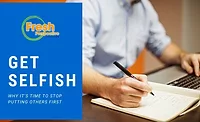Fresh Perspective
Stop Panicking About Coronavirus; Look Beyond Yourself

As major events are canceled across the country and our society pushes for social isolation, we begin to hear calls of courage and defiance.
“I refuse to live in fear.”
“We cannot put our lives on hold.”
“This has been blown way out of proportion. People are panicking over something that’s less deadly than the flu.”
I understand where you’re coming from. As we face the unknown, it’s important to resist panic. Alarmists have a way of making mountains out of mole hills—taking a challenge and turning it into a disaster. And when it comes to a pandemic like the coronavirus, you are right to be concerned about sacrificing your quality of life just to cater to fear.
That said, when you refuse to let an outbreak dictate your life, you are thinking only about how coronavirus affects you. Or—at best—you’re thinking about how the virus affects people like you. People who can afford to get sick, both physically and financially.
Here’s what you’re not considering.
We Are All Part of a Larger Whole
The choices we make affect those around us. Not just our families and coworkers, but the people who handle our money in restaurants, who sit beside us on the airplane, who encounter us and return home to their own families.
And in this larger community, there are many people who are more vulnerable than you.
You probably cannot even identify which lives are most likely to be turned upside down by the spread of COVID-19. Your young and vivacious neighbor could be on immunosuppressant medication. Your favorite barista could be one missed paycheck away from having her power shut off. That super ripped guy in your cycling club may be in stellar health, but after your post-ride drinks, he goes home to care for his elderly father.
You might feel like travel and social events are essential for your self-care. You may feel a powerful desire to be bold in the face of an epidemic. Those are good instincts. But it’s also important to remember that you do not live in a vacuum. You are part of a larger whole, a larger community, and even your “self-care” decisions have a ripple effect.
But What About the Economy?
This is where you tell me it isn’t just about your own quality of life. It’s about the businesses that suffer as flights, festivals, and NBA games are canceled. The more we isolate, the worse it becomes. The economy buckles, and by the time we overcome the virus, we’ve got an entirely new crisis on our hands.
You’re right. This pandemic is going to hit our economy hard. We have a long struggle ahead of us. Our country has overcome its fair share of recessions. But when people are gone, they’re gone forever.
Not to mention, the longer we resist taking measures to contain the virus, the worse the economic damages will be. Suffering patients will overwhelm understaffed and insufficiently equipped hospitals. We’ll have to take more severe measures to isolate ourselves and businesses will have to shutter their stores longer as we scramble to resolve an epidemic that never had to be this bad.
It’s uncomfortable to consider these things, especially if you’re naturally resistant to over-reacting. But as Americans, we have the benefit of looking at Italy and other countries who have already been hit hard. The evidence is there. This pandemic will knock us down. It calls for immediate action and our full attention.
No, you don’t need to fear for your life. But you do need to respect the large-scale societal repercussions of a fast-moving, previously unknown disease.
Ask Yourself, “What is My Role Here?”
We have so much more power than we give ourselves credit for. As human beings, everything we do influences everything around us. And when disaster strikes, we must ask ourselves, “What is my role here? How can support my community’s recovery? And have I played a part in creating this problem?”
Consider the continuing rise of environmental disasters. Recently, we all watched in horror as Australia battled massive wildfires. We posted words of support on social media, donated to recovery efforts . . .
. . . and then what?
What have we changed? What lessons do we take from the suffering we see around us?
Environmental disaster is our planet’s way of telling us, “I need more love. I need more compassion. I need you to stop sucking the life out of me for your own immediate gain.” When we don’t listen and adjust, the problem grows. It spreads and expands.
We can expect a similar outcome with the Coronavirus. As your news feed fills with more stories about infection, are you asking yourself how you can contribute to our country’s recovery?
Or are you saying, “I’m not going to let this outbreak change the way I live my life”?
You see, these precautions health officials are asking you take, they’re not about acting from a place of fear. They’re about making proactive decisions to slow the spread of the disease. They’re about you, as a member of a larger community, agreeing to give health professionals space and time to resolve the issue, instead of adding to their burden.
Courage is certainly a virtue.
But so is compassion.
Cheers,
Idan Shpizear
911RestorationFranchise.com
Looking for a reprint of this article?
From high-res PDFs to custom plaques, order your copy today!








